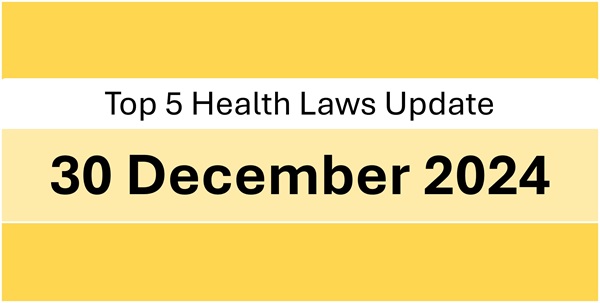Dear Readers, we are happy to share the most interesting legal and policy updates concerning health industry that we read today. we hope you enjoy reading it.
1. The District Consumer Disputes Redressal Commission (DCDRC) in Kochi has ordered a hospital and its doctor to pay ₹5 lakh in compensation after treating a patient for COVID-19 despite her RT-PCR test returning negative. The court found that the hospital failed to inform the patient of her negative status and administered unnecessary COVID-related treatments, causing significant mental and physical distress.
Source: bit.ly/40oTuIN
2. India’s drug regulator, CDSCO has identified 41 drug samples as ‘Not of Standard Quality’ (NSQ) following tests conducted in November, with an additional 70 samples flagged by state laboratories. Two samples were also found to be spurious, linked to unauthorized manufacturers. The Union Health Ministry has initiated investigations and emphasized that the identification of NSQ drugs is part of routine surveillance to enhance the quality of medicines available in the market.
Source: bit.ly/3PgINRZ
3. A pathologist in Maharashtra has been suspended and removed from the Medical Register by the Maharashtra Medical Council for three years for allowing a laboratory to use its signature while operating with an expired license.
Source: bit.ly/4fCsw4C
4. Homeopathic practitioners in Maharashtra are now permitted to prescribe allopathic medicines, provided they have completed a certified course in modern pharmacology, as per a new clarification from the Maharashtra Food and Drug Administration (FDA). However, the action has been criticized by the Indian Medical Association (IMA) as “mixopathy,” as it raises concerns about patient safety and the integrity of medical practice.
Source: bit.ly/41SZsCy
5. The Indian Medical Association (IMA) has launched the IMA AMR Smart Hospital Project, an initiative aimed at combating Antimicrobial Resistance (AMR) through advanced Antimicrobial Stewardship (AMS) and Infection Prevention and Control (IPC) practices. This certification program, the first of its kind globally, seeks to promote best practices in antimicrobial usage across hospitals and enhance patient safety.
Source: bit.ly/3DBawdC

